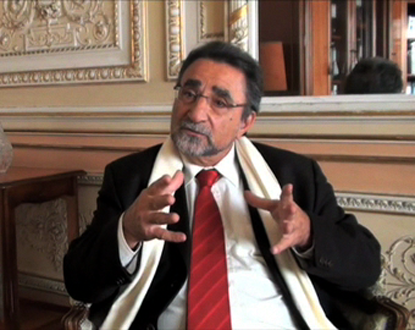A few weeks ago, Albert Marouani handed over his chair as President of the University of Nice to Frédérique Vidal. The former president reviews his 8 years at the head of UNSA.
 Nice Premium: You relinquished your position as president of the University of Nice a few days ago. What state of mind are you in?
Nice Premium: You relinquished your position as president of the University of Nice a few days ago. What state of mind are you in?
Albert Marouani: Completely serene with a feeling of lightness and great freedom of mind and time. I am convinced that the new president and her team will be committed to continuing and expanding the major projects I initiated during my term. I have no doubt that she will overcome minor internal quarrels and surround herself with competent and loyal individuals who are familiar with the institution’s affairs, so as not to waste any time.
NP: What is your assessment of your 8 years at the helm of the University?
AM: I published a document of about forty pages available on the University’s website that outlines the major actions undertaken during my two terms. I am particularly proud of having anchored UNS in the local landscape through strong relationships with local authorities and businesses closely associated with major development projects for our University and our region, such as the “promising campus” which secured funding of 60 million euros, half of which came from the state, enabling the completion of the STIC campus in Sophia Antipolis, supporting a major research institute project on cancer and aging (IRCAN) on the Pasteur tower, creating a student house in collaboration with the city of Nice on Saint-Jean d’Angély, and the Mediterranean Institute of Risk, Environment, and Sustainable Development (IMREDD) on the Var plain as part of the Eco-Valley project. Nationally, UNS is now considered one of France’s great research universities, ranking among the top fifteen French universities out of 86. It has been able to obtain several “Labex” and “Equipex” (laboratories and equipment of excellence) within the framework of “investments for the future” financed by the “grand loan”, which are evidence of recognition by independent scientific authorities of its reputation and excellence. Finally, since my first term, UNS has been listed in international rankings, including the Shanghai ranking, of the best universities worldwide for research and the attractiveness of their educational offerings. I am also very pleased to have led UNS towards autonomy by professionalizing its governance, controlling its budget, workforce, and jobs, creating a university foundation “Unice” and a partnership foundation “Dream-it”. During my two terms, we also significantly developed training and professional degrees at the master and bachelor’s levels, with around fifteen new professional bachelor’s programs rooted in the Côte d’Azur’s economic fabric. I am also quite proud to have created one of France’s best Scientific Culture Institutes (ICS), a major Institute for Research in Humanities and Social Sciences (ISHSN), the “Ulysses” Institute on tourism and hospitality, and the Higher Institute of Economics and Management (ISEM), which, alongside IAE, constitute a major regional and national higher education and research hub in economy-management. We have significantly developed our international relations towards the Mediterranean and Eastern countries (notably Russia). We have created a European Grouping of Territorial Cooperation (EGTC), the Euro-Mediterranean Campus, which brings together, in a vast cross-border area, four French universities, Nice, Corsica, Toulon, and Paris 6 (Oceanographic Observatory of Villefranche-sur-Mer) and two major Italian universities, Genoa and Turin. Finally, on the student life front, thanks to the dynamism of student associations, especially Face 06, we have significantly developed sports and cultural activities, created the alumni association (Alumnice), a major professional integration service (SOOIP), an integrated health service, and a welcoming service for foreign students.
NP: Do you have any regrets, projects you didn’t have time to implement?
AM: I regret the delays in CPER operations such as the European University Institute of Haute Tinée, Valrose, and Pasteur. I also regret not having had the time to finalize the Eco-campus initiative on the Var plain, as well as IMREDD, not having finalized the establishment of a partnership foundation on the environment, and not having set up selective bachelor’s courses to attract top high school graduates.
NP: Any advice for your successor, Frédérique Vidal?
AM: Every President leaves their mark, style, and ideas, and I don’t presume to give lessons to anyone. I believe my younger colleague Frédérique Vidal has all the qualities to become a good president, notably the ability to resist the pressure from those who always want to “unpick” what has been done without offering anything better. The role of President requires maintaining a broad vision, showing imagination, avoiding “micro-management”, knowing how to delegate, and mobilizing all energies and goodwill among teachers, students, BIATOSS staff, and our partners who wish to work for the good of our institution and the general interest.
NP: Will the economics professor you’ve become again continue to contribute to the university and its influence?
AM: As an emeritus professor following my retirement at the end of August 2012, I will continue to supervise the eight doctoral students under my guidance, deliver lectures, involve myself in the university’s international cooperation programs, participate in scientific conferences, and resume expertise for major international organizations in economic development, which is my specialty. Of course, all of this will contribute to the university’s influence. I also wish to be strongly involved in Euro-Mediterranean initiatives and the construction of a Euro-Mediterranean space for higher education and research, integrating the academic world, the business community, and the political sphere, especially local authorities around the Mediterranean basin. I believe deeply in the ability of science, education, research, and historical knowledge to unite and bring people together, offer a future to youth, and reconstruct this great Mediterranean civilization, which has been the cradle of humanity.


